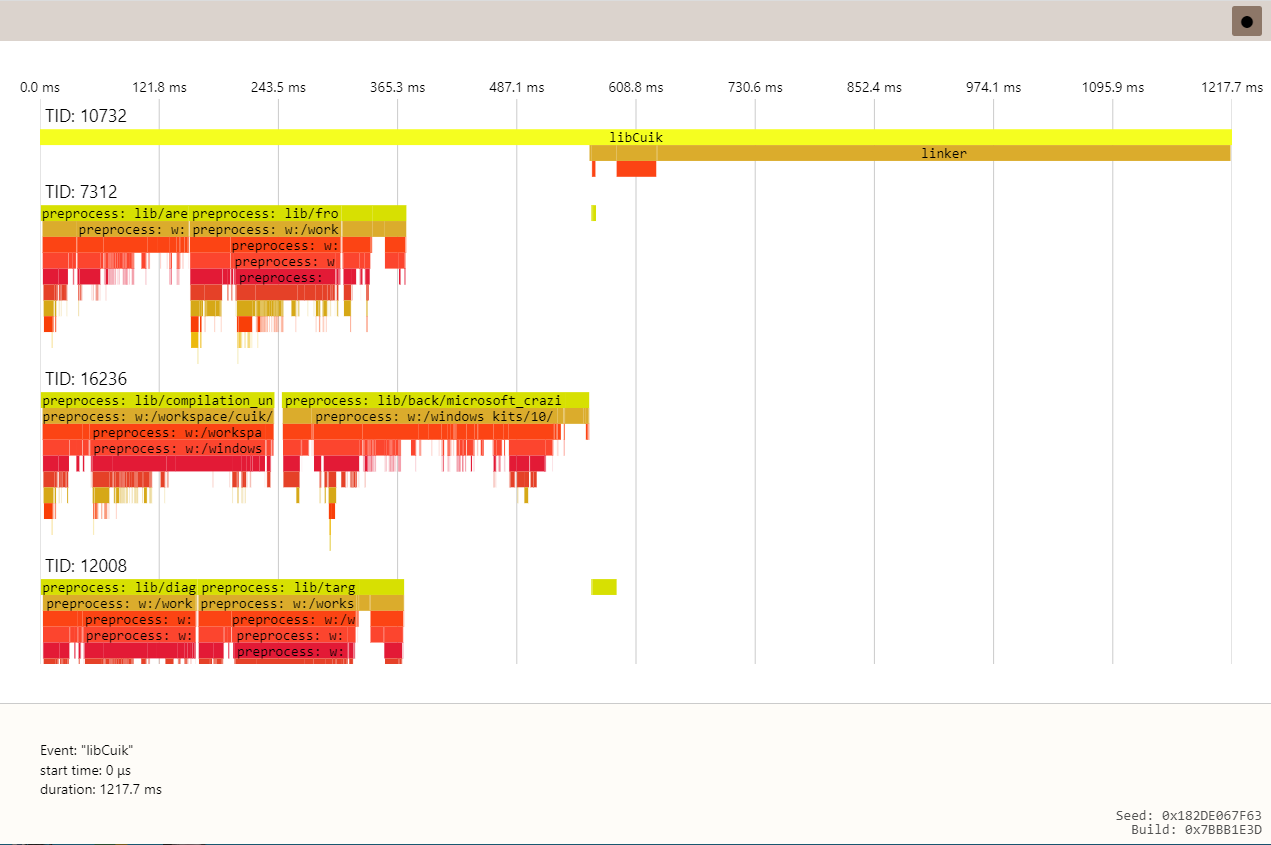spall ingests trace data and renders it as a navigatable flamegraph
spall currently supports 2 different file formats:
- JSON-ish, in Google's trace format
- .spall, a custom format described below
Spall takes events formatted with Google's JSON trace format They look like this:
[
{"cat":"function", "name":"main", "ph": "X", "pid": 0, "tid": 0, "ts": 0, "dur": 1},
{"cat":"function", "name":"myfunction", "ph": "B", "pid": 0, "tid": 0, "ts": 0},
{"cat":"function", "ph": "E", "pid": 0, "tid": 0, "ts": 0}
]
(spall doesn't care about trailing commas and close brackets are not required, to ease file creation / event streaming)
cat - Category of event. Currently unused
name - the name of the event, a string
ph - The type of event
| Type | Symbol |
|---|---|
| Begin | "B" |
| End | "E" |
| Complete | "X" |
tid - thread id, u32
pid - process id, u32
All tids and pids must be between 0 and u32_MAX, as whole values
ts - timestamp, a double, in microseconds
dur - timestamp, a double, in microseconds
(A timestamp of 1 starts at 1 μs)
Spall currently supports only Begin, End, and Complete events
{"cat":"function", "name":"foo", "ph": "X", "pid": 0, "tid": 0, "ts": 0, "dur": 1},
Complete events require a duration field, because they track a function's start/end all in one
{"cat":"function", "name":"myfunction", "ph": "B", "pid": 0, "tid": 0, "ts": 0},
{"cat":"function", "ph": "E", "pid": 0, "tid": 0, "ts": 0},
End events automatically close the most recent begin event with the same pid and tid, so they don't need names
BinEventType :: enum u8 {
Invalid = 0,
Custom_Data = 1,
Complete = 2,
Begin = 3,
End = 4,
Instant = 5,
Overwrite_Timestamp = 6,
Update_Checksum = 7,
}
BinHeader :: struct #packed {
magic: u64, // Expected to be 0x0BADFOOD
version: u64, // Currently version 0
timestamp_unit: f64, // 1 is 1 microsecond
must_be_0: u64,
}
Complete_Event :: struct #packed {
type: Event_Type,
pid: u32,
tid: u32,
time: f64,
duration: f64,
name_len: u8,
}
BeginEvent :: struct #packed {
type: BinEventType,
pid: u32,
tid: u32,
time: f64,
name_len: u8, // if the name is a 0-terminated string, the len must include the 0
// The name of the event must follow immediately after the begin event struct
}
EndEvent :: struct #packed {
type: BinEventType,
pid: u32,
tid: u32,
time: f64,
}The binary format is fairly close to the JSON format. A spall file contains a small header, and events. All values should be in little endian.
A valid file is structured roughly like this:
BinHeader
BeginEvent
event_name
EndEvent
...
Regardless of ingest format, all begin and end events within a thread (tid) are expected to be in earliest timestamp first, sorted order ex:
[
{"cat":"function", "name":"main", "ph": "B", "pid": 0, "tid": 0, "ts": 0},
{"cat":"function", "name":"foo", "ph": "B", "pid": 0, "tid": 0, "ts": 1},
{"cat":"function", "ph": "E", "pid": 0, "tid": 0, "ts": 2},
{"cat":"function", "ph": "E", "pid": 0, "tid": 0, "ts": 3}
]
Complete events can be unsorted
